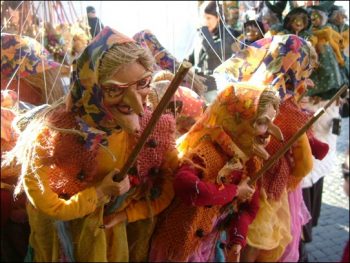Archive for January, 2009
Lezione di cucina Posted by Serena on Jan 14, 2009
In Italian we have two verbs which both have the meaning of “to cook”: Cucinare and Cuocere. Mi piace molto cucinare perche’ e’ creativo (I really like cooking because it’s creative). Cucinare means “to prepare and cook food”, which involves gathering the different ingredients needed for a recipe, then preparing and cooking them. I spend quite…
Timber! Posted by Serena on Jan 12, 2009
Warming oneself by the stufa a legna (wood burning stove) on these chilly winters evenings I have plenty of time to contemplate the importance of wood in our everyday lives, especially here in the heavily forested regions of Lunigiana in the north of Tuscany. In Italian we have both a feminine and a masculine form of the word for wood: legna (fem.)…
Homo Sapiens Posted by Serena on Jan 9, 2009
Homo Sapiens is a Latin construction meaning “Knowledgeable or Wise Human Being”. Sapiens, or in Italian Sapiente, comes from the verb sapere (to know), however in Italian we also have the verb conoscere (to know). These two verbs, conoscere and sapere, although both translating as “to know”, have different meanings, which are not interchangeable. Sapere…
Viva la Befana Posted by Serena on Jan 6, 2009
“Epifania, tutte le feste si porta via” (Epiphany brings an end to all the festivities). Epifania, a Latin word with Greek origins, means “(festival of) the apparition” or “manifestation (of the divinity)”. In the Catholic church the Epifania celebrates the visit of the Re Magi (the Wise Kings) to Gesu’ Bambino (Baby Jesus) on the…
Il Regista Italiano, Sergio Leone Posted by Serena on Jan 5, 2009
Last Saturday, the 3rd of January, was the 80th anniversary of the birth of the legendary Italian regista (director) Sergio Leone, an event that has been commemorated here in Italy by the many journalists and individuals who have payed tribute to his genius. According to an article in the Italian newspaper Corriere della Serra (3rd…
A different point of view! Posted by Serena on Jan 3, 2009
Mi piace l’italiano. The preceding sentence is a good example of the confusing difference between English and Italian when we talk about what we like. Literally translated as “Italian pleases me” what it actually means is “I like Italian”. Whereas in English the action of liking moves from the person to the object, in Italian…
Papà Natale è brutto e cattivo Posted by Serena on Jan 1, 2009
When I was eight years old a new girl came to my school. One day, talking with her about regali di Natale (Christmas presents) I discovered with great astonishment that her presents were brought not by Papà Natale (Father Christmas) but by Gesù Bambino (Baby Jesus). I had never heard of such a thing, and…



